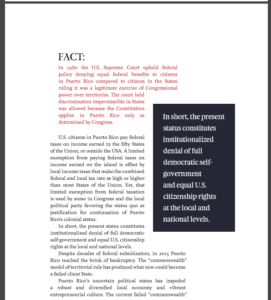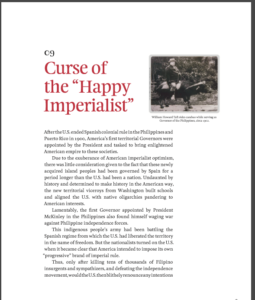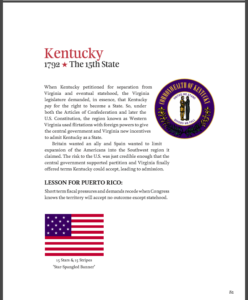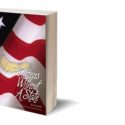As Puerto Rico continues to show up in the headlines of U.S. mainland news sources, one thing becomes more and more clear: people are confused about Puerto Rico’s relationship with the United States.
Visitors to PR51st.com have a lot of questions:
- Is Puerto Rico a state?
- Why isn’t Puerto Rico a state?
- Is Puerto Rico a country?
- Why should the U.S. help Puerto Rico?
- Why doesn’t the president help Puerto Rico?
- What does Congress have to do with Puerto Rico?
We answer these questions in this blog, one by one. But the position of Puerto Rico is complex, and it can’t be fully understood without reference to the history of Puerto Rico and to the legal decisions that have been made about Puerto Rico for over a century.
What’s more, Puerto Rico’s dilemma is not just a political issue. It’s a human rights issue. Those of us who live in the United States, whether we have any specific connection with Puerto Rico or not, cannot ignore the inequality faced by 3.5 million of our fellow U.S. citizens who live in Puerto Rico.
Howard Hills, former lead counsel on territorial status for the White House (NSC) and former General Counsel of a State Department agency, has written a clear and readable explanation of the entire complex question of Puerto Rico’s status in his forthcoming book, Citizens Without a State.
Those who only have known the blessings of living in our fifty States take for granted every day civil and political rights denied in Puerto Rico because it remains a U.S. territory instead of a State.
For more than three and a half million U.S. citizens Puerto Rico is home, where people go about “the pursuit of happiness” just as we do in our own hometowns across the nation. The jarring difference is that citizens in Puerto Rico do not have equal rights under the laws of our nation when it comes to “pursuit of happiness” issues like taxes, fighting wars, or health care.
Can you imagine waking up tomorrow, owing allegiance to the U.S. government under federal law, but without the right to vote in elections for those who make the national laws under which we all live?
This is the reality of daily life for the people of Puerto Rico.
Citizens Without a State begins with a clear explanation of how Puerto Rico came to be a possession of the United States and a simple description of how the experience of U.S. citizenship is different for the residents of Puerto Rico from those of the mainland United States.
Hills goes on to lay out the ways in which these facts contradict the ideals and values of the United States and the American people — and what it will mean when these historical failures are corrected.
Seeing America make good on its promise of government by consent in Puerto Rico offers hope to people throughout the world. Puerto Rico is democracy’s current litmus test. In the spirit of our freedom-loving ancestors, the promise of America must now be redeemed in Puerto Rico.
Next comes the complicated story of the legal battles over Puerto Rico’s status. They are complex, but Hills breaks them down to make them comprehensible.
- What does it mean to be a citizen?
- What does it mean to be a territory?
- What happens when a Supreme Court decision made a century ago still determines laws today?
- How did the relationship of the United States with Cuba and the Philippines change the future of Puerto Rico?
- What did the adoption of Puerto Rico’s constitution in the 1950s mean?
- What did the status referendum of 2012 mean?
 Citizens Without a State answers these and other thorny questions with wit and clarity. This is a book for people who want to understand what is really going on in Puerto Rico.
Citizens Without a State answers these and other thorny questions with wit and clarity. This is a book for people who want to understand what is really going on in Puerto Rico.
It’s also a book for people who are interested in history and law — even if they don’t want to read 400 page tomes on the subject. It’s ideal for your classroom or your book club.
Following the story of Puerto Rico’s status, Hills has included an overview of the 32 states which used to be territories. He provides a quick, clear summary of their struggles for statehood and the lessons each one can have for Puerto Rico and Puerto Rico’s struggle for statehood.
Again, this is clearly a good choice for the classroom, but it’s also an easy and satisfying read for American history buffs.
But beyond the pleasure readers can gain from delving into this interesting piece of our history and current events, and beyond the opportunity to educate ourselves on an important and often-overlooked human rights issue, Citizens Without a State also gives us all a chance to push aside the misunderstandings and intentionally misleading propaganda that clouds this issue. 
Hills is an expert on all the questions detailed in the book. His high-level experience with international claims, treaty negotiations, immigration and nationality law, and administration of U.S. off-shore territories, gained while he was lead counsel for the White House (NSC) in U.S. Congress and federal courts and dealing with territorial decolonization issues in the U.N. Security Council. Where many of the discussions of Puerto Rico’s status come from people’s feelings and political opinions — and there’s nothing wrong with that — Citizens Without a State comes from decades of intimate involvement in the details of the decisions that affect Puerto Rico and the nation.
This makes it all the more impressive that Citizens Without a State is such an enjoyable read. At just under 150 pages, this book can give you the basic knowledge you need to understand the pressing question of Puerto Rico’s status in an afternoon.
Buy Citizens Without a State as a print book or digital download
Buy Citizens Without a State as a Kindle book at Amazon.








One response
[…] in the the most prestigious legal journals. To reach beyond the legal profession, his new book Citizens Without A State was specially written and its unique layout was designed for a general audience, not just for […]